Are B.C. Businesses ready for the AI Race?

This article is based on insights from our report Accelerating AI Adoption in B.C., developed as part of our Agenda for Economic Growth.
Artificial intelligence (AI) is rapidly transforming the way businesses operate, from how they serve customers and market products to how they manage operations and drive growth. While adoption levels vary, the opportunity for Greater Vancouver’s business community is clear: by embracing AI strategically and inclusively, we can strengthen our economy, boost competitiveness, and unlock long-term growth for businesses of all sizes.
Around the world, companies are already using generative AI to write code, build marketing campaigns, serve customers, and streamline operations. The early movers are reaping productivity gains and reshaping how business gets done. And while others may have taken an early lead, Greater Vancouver still has the opportunity to chart its own path toward long-term economic growth, but only if we act now.
AI is not just another emerging technology; it is already delivering real results for businesses through productivity gains, cost savings, and increased efficiency. Recognizing its full potential and scaling its use across sectors will help B.C. businesses stay competitive and unlock even greater growth. While a number of B.C. businesses are leading the way in AI-focused digital transformation, others can learn from them.
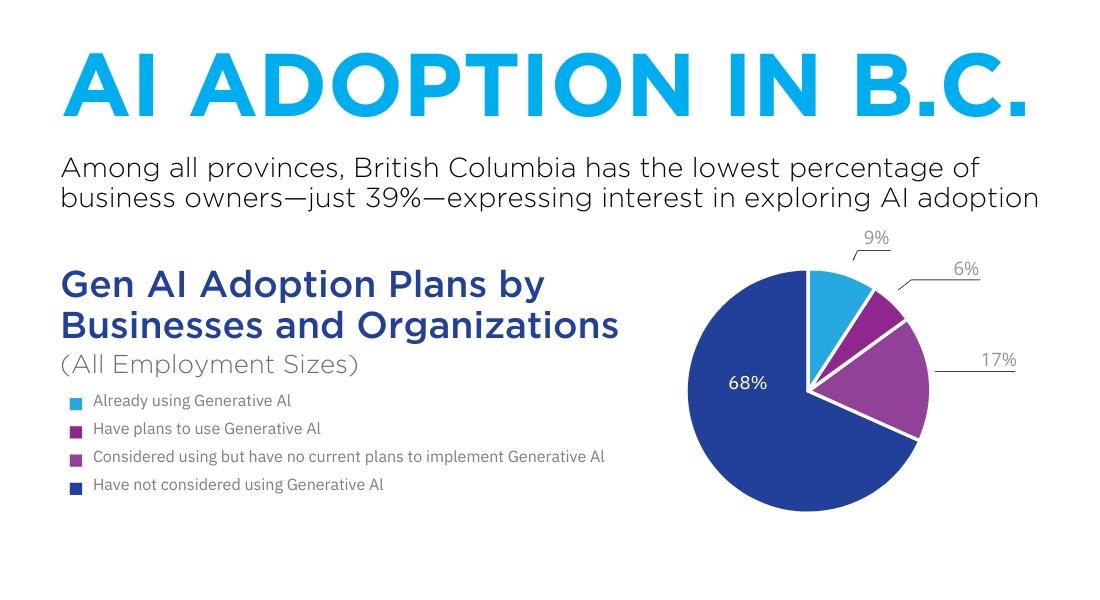
The data tells a clear story. Currently, only 39 percent of businesses in British Columbia have even considered integrating AI into their operations. This is lower than in other provinces such as Quebec, where 48 percent of businesses are exploring AI adoption. Only 15 percent say they are using or plan to use it, compared with 18 percent in Ontario and 12 percent in Nova Scotia.
This places British Columbia in the middle of the curve when it comes to AI adoption across Canada.
But this is not a story about tech hesitancy. It is a story about structural barriers. The businesses that are moving quickly are larger, better resourced, and more data rich. They have the budgets to experiment and the teams to integrate AI tools strategically. Supporting all businesses to overcome these challenges is key to broadening adoption and driving economic growth.
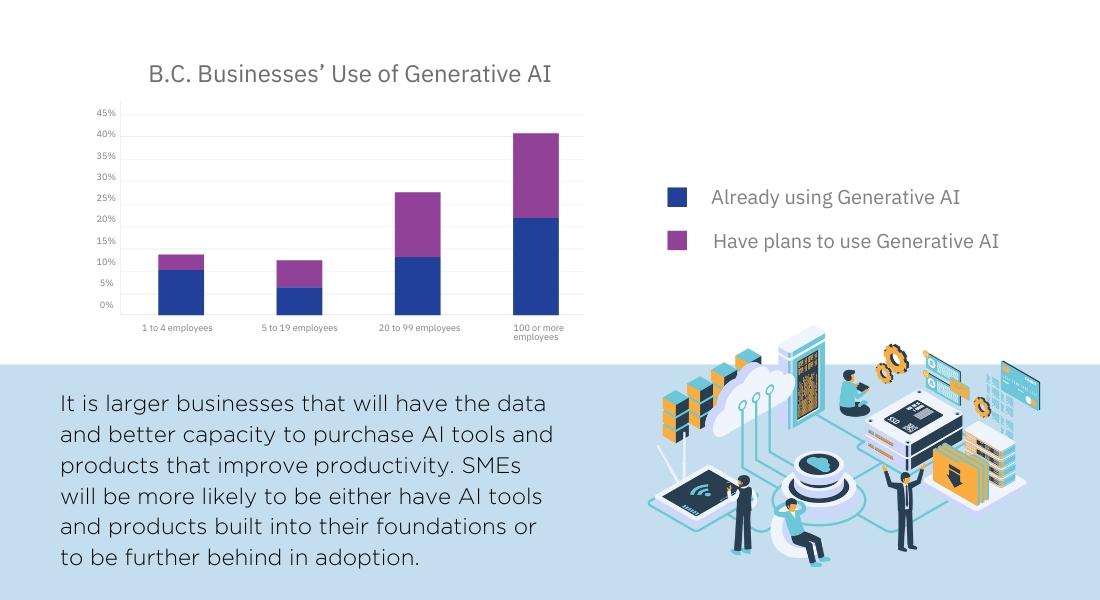
On the other hand, small and medium-sized businesses (SMEs), which make up 98 percent of B.C.’s economy, are struggling to even get to the table. And that is deeply concerning. These are the businesses that fuel our communities, provide local jobs, and make up the economic backbone of our province.
When the foundation lags behind, the whole house feels it. But size is not the only factor; there is also a generational divide. This structural gap, not a lack of ambition, is what is slowing us down.
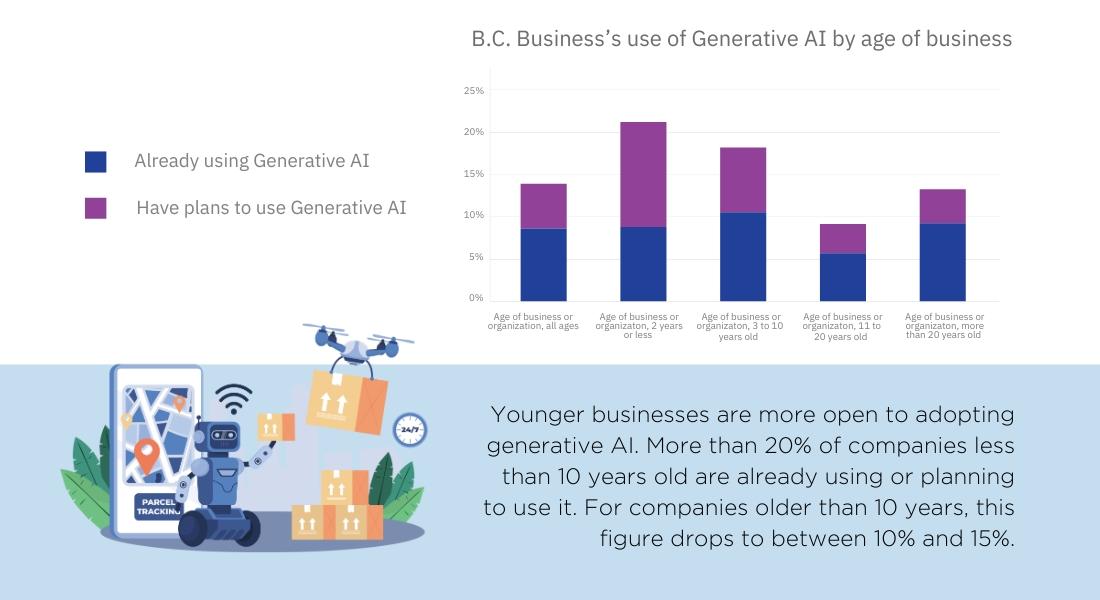
The divide becomes even more visible when we look at company size and age. Businesses with 100 or more employees are far more likely to be using AI compared to those with fewer than 20 employees. The businesses that are moving quickly tend to be larger, better resourced, and more data rich. They have the budgets to experiment and the teams to integrate AI tools strategically. Yet, it is the small businesses that fuel local economies, create jobs, and serve as the backbone of our communities. If AI becomes the default, and all signs suggest it will, these smaller businesses risk being left behind without meaningful support.
While we have data that highlights current challenges, we do not have to look too far for promising examples.
One group in B.C. is showing real momentum - exporters.
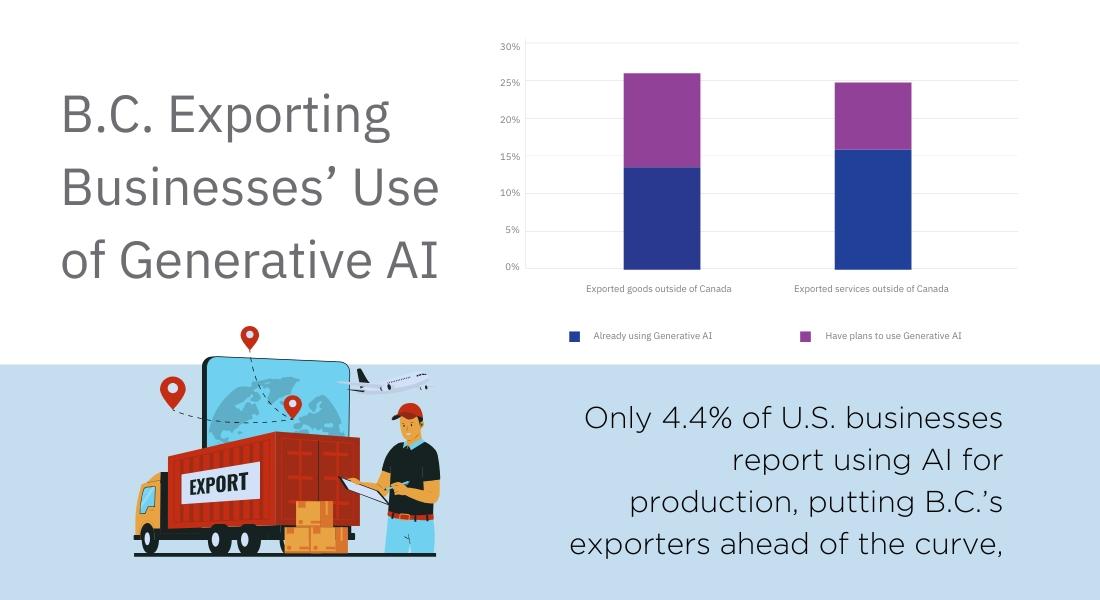
Over 25 percent of export-focused businesses are already using or planning to use AI, far above the provincial average. Global competitiveness is clearly driving change, and these firms are adapting under pressure. If we bring that same urgency to our broader economy, we can close the gap faster than we think.
Through our new report, Accelerating AI Adoption in B.C., we have outlined a series of recommendations for government, including:
- Encourage and enable the public and private sectors to adopt AI:
This includes creating a business environment with clear, consistent regulations that foster innovation while addressing ethical and privacy concerns. The government can lead by example through adopting AI internally to improve efficiency and service delivery, sharing success stories to build trust, and prioritizing support for high-value, B.C.-based AI companies in sectors with strong growth potential.
- Ensure a sufficient AI talent pool for B.C. businesses:
To build Canada’s most AI-ready workforce, existing training programs such as the AI Adoption Program should be leveraged and promoted across career stages and regions. Further development of AI-focused courses, certifications, and micro-credentials will support reskilling and upskilling for those working in or alongside AI technologies. Additionally, a Digital Skills Index could be considered to measure and improve workforce readiness.
- Harness data for public good:
Access to high-quality data is essential for AI innovation. We encourage expanding open-data policies to provide greater access to government datasets and partnering with industry to identify and share valuable data sets in ways that enable the private sector to develop effective AI solutions.
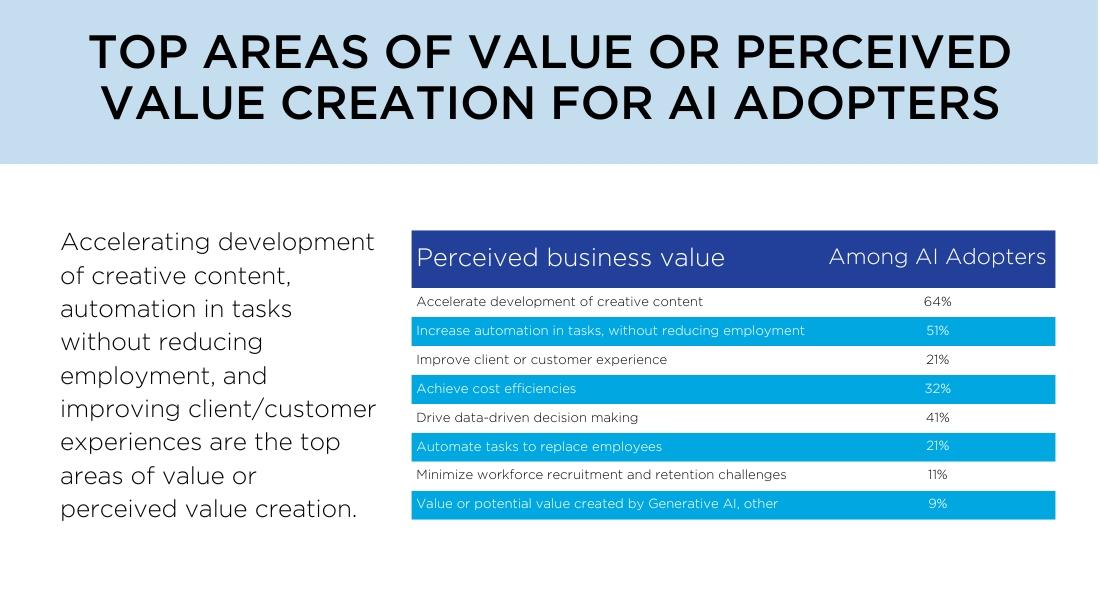
GVBOT launched the AI Adoption Program, developed and powered by KPMG, to empower businesses with a deeper understanding, greater confidence, and a strategic roadmap to navigate AI. This kind of real-world enablement is essential to move from ideas to action and to help businesses realize tangible benefits.
For those adopting AI, the top areas of value include driving operational efficiencies, reducing costs, enhancing customer experiences, and increasing revenue. These benefits not only improve competitiveness but also free up time and resources to focus on what matters most.
Through our Agenda for Economic Growth – The 3% Challenge, we are calling on the province to raise B.C.’s annual GDP growth to 3 percent by 2030. AI will be one of the most important tools to help us get there.
This is not about replacing people. It is about empowering them and enabling businesses to grow smarter and faster. AI is already here. The question is not whether we will adopt it; the question is whether we will do it quickly enough to stay competitive. Let us move forward together, with the full strength of B.C.’s business community behind us.